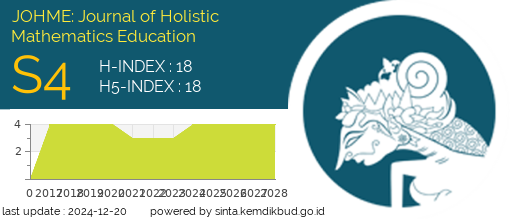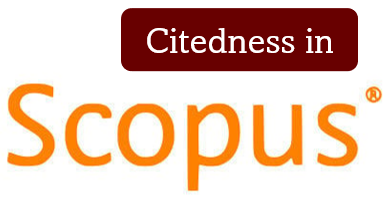PENGARUH PENDEKATAN PROBLEM BASED LEARNING BERBANTUAN MASALAH OPEN-ENDED TERHADAP KEMAMPUAN BERPIKIR KRITIS DITINJAU DARI SIKAP MATEMATIS SISWA [THE INFLUENCE OF THE PROBLEM-BASED LEARNING MODEL ASSISTED BY OPEN-ENDED PROBLEMS TOWARDS MATHEMATICAL CRITICAL THINKING SKILLS BASED ON STUDENTS' MATHEMATICAL ATTITUDE]
DOI:
https://doi.org/10.19166/johme.v3i1.1912Keywords:
Critical Thinking, Mathematical Attitude, Problem Based Learning, berpikir kritis, sikap matematisAbstract
This research aimed to: 1) compare the mathematical critical thinking skills of students who were taught with the Problem Based Learning model assisted by open-ended problems and students who were traditionally taught, 2) investigate the interaction between problem based learning models with mathematical attitudes towards students' mathematical critical thinking abilities. It was a quantitative study using a quasi-experimental method with a 2 x 2 factorial design and was conducted at SMA Negeri 1 Cibal, Manggarai district, East Nusa Tenggara. Two classes were experimental and two classes were control and were chosen using cluster random sampling techniques. Data were obtained through questions to measure mathematical critical thinking skills and mathematical attitude questions and then analyzed with two way ANOVA. The data analysis and interpretation showed that 1) the mathematical critical thinking skills of students who were taught with the Problem Based Learning model assisted by open-ended problems were better than those of students who have been traditionally taught 2) there was no interaction between the problem based learning model and students' mathematical critical thinking abilities. This means that both students who had high and low mathematical attitudes scores when taught with the Problem Based Learning approach assisted with open-ended problems were always better than students who are taught with conventional approaches.
BAHASA INDONESIA ABSTRACT: Penelitian ini bertujuan untuk; 1) membandingkan kemampuan berpikir kritis matematika siswa yang mengikuti model problem based learning berbantuan masalah open-ended dengan kemampuan berpikir kritis matematika siswa yang mengikuti pembelajaran konvensional. 2) melihat interaksi antara model problem based learning dengan sikap matematis terhadap kemampuan berpikir kritis matematika siswa. Penelitian ini merupakan penelitian eksperimen semu (quasi experiment) dengan rancangan factorial 2 x 2. Populasi dalam penelitian ini adalah siswa kelas X SMA Negeri 1 Cibal kabupaten Manggarai, Nusa Tenggara Timur. Pengambilan sampel dilakukan dengan menggunakan teknik cluster random sampling, 2 kelas sebagai kelas eksperimen dan 2 kelas sebagai kelas kontrol. Instrumen penelitian yang digunakan berupa tes kemampuan berpikir kritis matematika dan tes sikap matematis. Data yang telah terkumpul dianalisis dengan menggunakan uji Anava Dua Jalur. Sebelum digunakan uji anava dua jalur, data tersebut terlebih dahulu dilakukan uji normalitas dan homogenitas. Hasil penelitian ini menunjukkan; 1) kemampuan berpikir kritis siswa yang mengikuti pembelajaran matematika dengan model Problem Based Learning berbantuan masalah open-ended lebih baik daripada siswa yang mengikuti pembelajaran matematika dengan pendekatan konvensional; 2) tidak terdapat interaksi antara pendekatan pembelajaran Problem Based Learning dengan sikap matematis siswa terhadap kemampuan berpikir kritis matematika siswa. Artinya baik siswa yang memiliki sikap matematis tinggi maupun yang memiliki sikap matematis rendah apabila diajarkan dengan pendekatan pembelajaran Problem Based Learning berbantuan masalah open-ended selalu lebih baik dibanding siswa yang dibelajarkan dengan pendekatan konvensional.
References
Abdullah, N. I., Tarmizi, R. A., & Abu, R. (2010). The effects of Problem Based Learning on mathematics performance and affective attributes in learning statistics at form four secondary level. Procedia - Social and Behavioral Sciences, 8(5), 370-376. https://doi.org/10.1016/j.sbspro.2010.12.052
Aizikovitsh, E., & Amit, M. (2010). Evaluating an infusion approach to the teaching of critical thinking skills through mathematics. Procedia - Social and Behavioral Sciences, 2(2), 3818-3822. https://doi.org/10.1016/j.sbspro.2010.03.596
Anazifa, R. D. (2016). The effect of problem-based learning on critical thinking skills and student achievement. Proceeding of 3rd International Conference on Research, Implementation and Education of Mathematics and Science, 43-48.
Bartholomew, S. R., Moon, C., Ruesch, E. Y., & Strimel, G. J. (2019). Kindergarten student’s approaches to resolving open-ended design tasks. Journal of Technology Education, 30(2), 90-115. https://doi.org/10.21061/jte.v30i2.a.6
Chukwuyenum, A. N. (2013). Impact of critical thinking on performance in mathematics among senior secondary school students in Lagos State. IOSR Journal of Research & Method in Education (IOSRJRME), 3(5), 18-25. https://doi.org/10.9790/7388-0351825
Crowley, B. M. (2015). The effects of problem-based learning on mathematics achievement of elementary students across time. Masters Theses & Specialist Projects. Retrieved from http://digitalcommons.wku.edu/theses/1446
Demirel, M. (2016). Effects of problem-based learning on attitude: A meta-analysis stud. EURASIA Journal of Mathematics, Science & Technology Education, 12(8), 2115-2137. https://doi.org/10.12973/eurasia.2016.1293a
Elçi, A. N. (2017). Students’ attitudes towards mathematics and the impacts of mathematics teachers’ approaches on it. Acta Didactica Napocensia, 10(2), 99-108. https://doi.org/10.24193/adn.10.2.8
Elliott, B., Oty, K., McArthur, J., & Clark, B. (2001). The effect of an interdisciplinary algebra/science course on students’ problem solving skills, critical thinking skills and attitudes towards mathematics. International Journal of Mathematical Education in Science and Technology, 32(6), 811-816. https://doi.org/10.1080/00207390110053784
Gunur, B., Makur, A. P., & Ramda, A. H. (2018). Hubungan antara kemampuan numerik dengan kemampuan pemecahan masalah matematis siswa di pedesaan. MaPan: Jurnal Matematika dan Pembelajaran, 6(2), 148-160. https://doi.org/10.24252/mapan.2018v6n2a2
Haciomeroglu, G. (2017). Reciprocal relationships between mathematics anxiety and attitude towards mathematics in elementary students. Acta Didactica Napocensia, 10(3), 59-68. https://doi.org/10.24193/adn.10.3.6
Junaidi. (2017). Analisis kemampuan berpikir kritis matematika siswa dengan menggunakan graded response models di SMA Negeri 1 Sakti. Numeracy, 4(1), 14-25. Retrieved from https://numeracy.stkipgetsempena.ac.id/?journal=home&page=article&op=view&path%5B%5D=46&path%5B%5D=44
Limpo, J. N., Oetomo, H., & Suprapto, M. H. (2013). Pengaruh Lingkungan Kelas Terhadap Sikap Siswa Untuk Pelajaran Matematika. Humanitas (Indonesian Psychological Journal), 10(1), 37-48. http://dx.doi.org/10.26555/humanitas.v10i1.327
Lorentzen, L. (2013). Limiting behavior of random continued fractions. Constructive Approximation, 38(2), 171-191. https://doi.org/10.1007/s00365-013-9198-y
Makur, A. P., Prahmana, R. C. I., & Gunur, B. (2019). How mathematics attitude of mothers in rural area affects their children’s achievement. Journal of Physics: Conference Series, 1188(1), 1-10. https://doi.org/10.1088/1742-6596/1188/1/012009
Mustaffa, N., Ismail, Z., Tasir, Z., & Said, M. N. H. M. (2016). The impacts of implementing problem-based learning (PBL) in mathematics: A review of literature. International Journal of Academic Research in Business and Social Sciences, 6(12), 490-503. https://doi.org/10.6007/ijarbss/v6-i12/2513
Nusarastriya, Y. H., H, H. S., Wahab, A. A., & Budimansyah, H. D. (2013). Pengembangan berpikir kritis dalam pembelajaran pendidikan kewarganegaraan menggunakan project citizen. Jurnal Cakrawala Pendidikan, 3(3), 444-449. https://doi.org/10.21831/cp.v3i3.1631
Padmavathy, R. D., & Mareesh, K. (2013). Effectiveness of problem based learning in mathematics. International Multidisciplinary E-Journal, 2(1), 45-51. Retrieved from http://shreeprakashan.com/Documents/2013128181315606.6. Padma Sasi.pdf
Palinussa, A. L. (2013). Students’ critical mathematical thinking skills and character: Experiments for junior high school students through realistic mathematics education culture-based. Journal on Mathematics Education, 4(1), 75-94. https://doi.org/10.22342/jme.4.1.566.75-94
Rahmi, S., Nadia, R., Hasibah, B., & Hidayat, W. (2017). The relation between self-efficacy toward math with the math communication competence. Infinity Journal, 6(2), 177-182. https://doi.org/10.22460/infinity.v6i2.p177-182
Ramda, A. H., Prahmana, R. C. I., Mulu, H., & Gunur, B. (2018). Kemampuan konservasi panjang pada siswa usia 6-7. Jurnal Gantang, 3(2), 109-116. https://doi.org/10.31629/jg.v3i2.480
Ramdani, Y. (2011). P-82 Enhancement of mathematical reasoning ability at senior high school by the application of learning with open ended approach. Building the Nation Character through Humanistic Mathematics Education.
Selvianiresa, D., & Prabawanto, S. (2017). Contextual teaching and learning approach of mathematics in primary schools. Journal of Physics: Conference Series, 895(1), 1-7. https://doi.org/10.1088/1742-6596/895/1/012171
Setiawan, R. H., & Harta, I. (2014). Pengaruh pendekatan open-ended dan pendekatan kontekstual terhadap kemampuan pemecahan masalah dan sikap siswa terhadap matematika. Jurnal Riset Pendidikan Matematika, 1(2), 241. https://doi.org/10.21831/jrpm.v1i2.2679
Simanjuntak, M. F., & Sudibjo, N. (2019). Meningkatkan keterampilan berpikir kritis dan kemampuan memecahkan masalah siswa melalui pembelajaran berbasis masalah. JOHME: Journal of Holistic Mathematics Education, 2(2), 108-118. https://doi.org/10.19166/johme.v2i2.1331
Su, H. F. H. “Angie,” Ricci, F. A., & Mnatsakanian, M. (2015). Mathematical teaching strategies: Pathways to critical thinking and metacognition. International Journal of Research in Education and Science, 2(1), 190-200. https://doi.org/10.21890/ijres.57796
Tik, C. C. (2014). Problems implementing problem-based learning by a private Malaysian University. Journal of Problem Based Learning in Higher Education, 2(1), 11-17. https://doi.org/10.5278/ojs.jpblhe.v2i1.1005
Viseu, F., & Oliveira, I. B. (2012). Open-ended tasks in the promotion of classroom communication in mathematics. International Electronic Journal of Elementary Education, 4(2), 287-300. Retrieved from https://www.iejee.com/index.php/IEJEE/article/view/200/196
Wahyu, W., Kurnia, & Syaadah, R. S. (2018). Implementation of problem-based learning (PBL) approach to improve student’s academic achievement and creativity on the topic of electrolyte and non-electrolyte solutions at vocational school. Journal of Physics: Conference Series, 1013(1), 1-7. https://doi.org/10.1088/1742-6596/1013/1/012096
Zetriuslita, & Ariawan, R. (2017). The effectiveness of problem-based learning materials in improving students”˜ mathematical critical thinking skills : A study in calculus course. 6th International Conference on Education, Humanities and Social, Sciences Studies (EHSSS-17), 52-54. https://doi.org/10.17758/eap.eph317039Downloads
Published
How to Cite
Issue
Section
License
Authors who publish with this journal agree to the following terms:
1) Authors retain copyright and grant the journal right of first publication with the work simultaneously licensed under a Creative Commons Attribution License (CC-BY-SA 4.0) that allows others to share the work with an acknowledgement of the work's authorship and initial publication in this journal.
2) Authors are able to enter into separate, additional contractual arrangements for the non-exclusive distribution of the journal's published version of the work (e.g., post it to an institutional repository or publish it in a book), with an acknowledgement of its initial publication in this journal.
3) Authors are permitted and encouraged to post their work online (e.g., in institutional repositories or on their website). The final published PDF should be used and bibliographic details that credit the publication in this journal should be included.”










